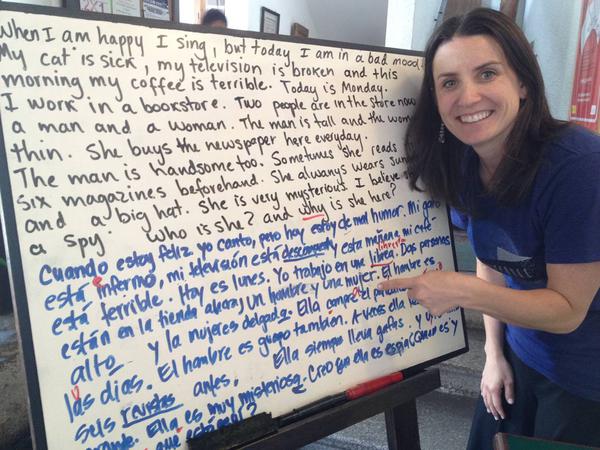
FEATURE — According to my husband, “If you don’t crash, you aren’t skiing hard enough.” Our boys enthusiastically heed his advice and compare wipeout stories at the end of ski days.
During these debriefings, I hear things like:
“The snow went down my bib so far it made my underwear wet.”
“Did you see my big ‘yard sale?'”
“And that’s when I saw my right ski fly off.”
I don’t exactly endorse this ski-until-you-crash motto (because I’m a mom and I worry), but I get what my husband wants — he wants our boys to push themselves.
They push. They crash. They learn. That’s how they get better.
A case in the converse is me and Spanish. I grew up in California. I heard native speakers around me every day. I spent three years in high school and two more years in college studying Spanish. Yet after all of that exposure, I was a virtual mute.
I could read Spanish. I could write Spanish. But I could not speak Spanish. Truth check: I would not speak Spanish.
Why? I was too afraid of making a mistake. I had just spent five years studying and I wanted to sound like it when I spoke.
So when someone started hablaing with me, I retreated into my head. There I searched for the perfect vocabulary. I conjugated and re-conjugated my verbs. I matched my masculine and feminine articles with their corresponding nouns.

And by the time my masterpiece was ready, the moment had passed.
Fast-forward several years to my month-long Spanish immersion in Antigua, Guatemala. It was Friday afternoon of week one. I had already spent nearly 20 hours sitting across the table from my teacher working diligently to recover the language I had studied in my youth.
Some of my Spanish was coming back, but it was happening more slowly than I’d hoped. It turns out that over the course of a decade and three children, I’d lost a lot of vocabulary and couldn’t remember how to conjugate verbs in the past preterite.
And so as I sat there winding down my lessons for the week in the beautifully flowered courtyard of the language school, hot tears filled my eyes and erupted onto my cheeks.
“Que paso?” my teacher inquired.
But all I could produce were more tears — and a little snot.
After a solid minute of unabashed sobbing, I finally explained myself: I was completely and utterly frustrated. Frustrated at myself for not speaking Spanish when I was in college; frustrated that it wasn’t coming back faster now; and frustrated that I hadn’t somehow become completely fluent in a week.
My teacher smiled at me and delivered some sage advice: “Poco a poco, mi amiga.” Little by little, my friend.
Over the next three weeks in Guatemala, whenever I felt frustrated, which was often, I tried to remember those wise words. Because little by little is how any progress happens.
You push yourself a little. You “crash.” You learn. You get better. And you don’t find yourself twenty years after the fact sobbing in a Guatemalan language school.
Bad Spanish is nothing more than a good ski crash. It just means you are trying.
So here’s to crashing (a poco) in 2016.
Kat Dayton is a developing columnist with St. George News. Any opinions stated are her own and may not be representative of St. George News.
Email: [email protected] | [email protected]
Twitter: @STGnews
Copyright St. George News, SaintGeorgeUtah.com LLC, 2015, all rights reserved.